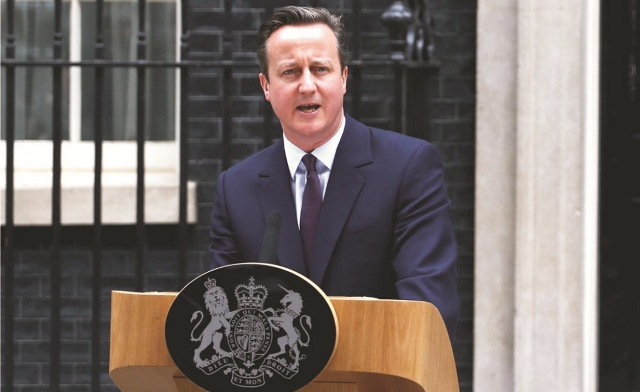Editorial
Lessons From Brexit

When the Prime Minister of Great Britain, Mr David Cameron said that Nigeria was
fantastically corrupt, nobody imagined that he would be leaving office before his term owing to his being fantastically committed to the time-honoured ideals of democracy.
After years of speculations, the United Kingdom actually entered a referendum for her people to decide whether or not to remain in the European Union, EU that had become a major economic and political bloc in the world. The June 23, 2016 Referendum voted the British to exit (Brexit) the European Union.
Because the outcome was against the stand of the Prime Minister, he honourably decided to resign and leave office in October. Thereafter, quite a lot of things have happened in quick successions; The stock market reacted, the rest of Europe reacted and the world is watching as the last has not been heard of this historic decision.
Outside Europe, nations, institutions and individuals are still looking around to see how Brexit might affect their interests. Indeed, some countries under the European Union have started wondering if they would not also allow their citizens to vote as the Britain did. This is more so because events across the world have revealed that whether one stays or exits the union, the realities are dire.
For us in Nigeria, it will pay us more if we will take a deeper look at the referendum with a view to drawing a lesson or two, especially, as it concerns the culture and tradition of politics. Indeed, Britain has through this referendum proven that it has men of honour in politics and the capacity to involve the people in governance.
Of course, Eurocentrism is a much recent fantasy compared to the deep seated issues that daily test the peace of Nigeria. Young as the issue is, the government did not assume to know all that should be done; after all, they represent the people. But they decided to involve the people.
As a matter of fact, the referendum on this seemingly simple matter is very significant because this is one issue that only the Queen of England could have decided. Besides, Britain is the Europe’s Europe that any blind participation would only be natural and perhaps commendable. But the people as the custodians of power were not forgotten.
If the referendum was not done, government and indeed the leadership of Great Britain could not have known that the idea of remaining in the European Union was not going down well with a majority of the people. Apart from the fear of job losses, the undue exposure of Britain to all comers raises a security flag.
The decision of the Prime Minister to step aside was most honourable and commendable. Like some others who would resign over mere suspicion or scandal, Cameron has shown class. In Nigeria, public office holders feel no shame nor do the people reject such obviously undeserving persons in leadership.
While we may have to single out President Goodluck Ebele Jonathan and Sunday Oliseh who walked away from plum jobs based on principle, the failure of morality in governance will remain an albatross of the country. Right now, some office holders are not ashamed as they seek all tricks in the book to cover questions on their qualifications and stolen funds among others.
But more instructive is the deliberate involvement of the people in government. Indeed, the claim to being a democracy is losing veracity by the day. The definition of democracy has been of the people, by the people and for the people. In Nigeria, it is more of, ‘by the political party, for the elite and of the ethnic majority.’
In every democracy, the people have the right to choose their leaders through election and adopt policies and programmes by referendum. In Nigeria, there are so many issues that should have been subjected to referendum if people are actually the owners of the country. But successive governments only assume office and become the lords and masters of the slaves.
Following years of grudges and failed expectations, Nigeria was forced to convoke a National Conference. Sadly, the selection of persons to participate at all the two conferences were questionable as the ethnic groups who should be discussing on the terms of coexistence are swallowed up. Also faulty was the issue of no-go areas.
It is sad that the outcome of these limited conferences that attempted to address some issues that could have taken Nigeria to another level has been thrown away. The decision of the people is thrown away and people are wondering why things are not working for the country. Thrown away when nations are asking their people to contribute ideas.
The Tide believes that it is not too late for Nigerians to be organised to decide on how they inter-relate, manage resources, including land and choose their leaders. It is not too late.
Editorial
Beginning A New Dawn At RSNC

Editorial
Sustaining OBALGA’s Ban On Street Trading

Editorial
AFCON ’25: Bravo, Super Eagles, But…




